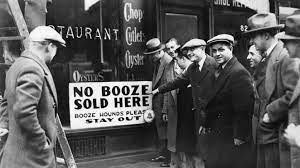In the pages of American history, the era of Prohibition marks a significant paradox – a marked disapproval of alcohol set against the backdrop of a nation famous for distilling exceptional spirits. Enshrined as the 18th Amendment to the Constitution and enacted on January 16, 1920, Prohibition outlawed the “manufacture, sale, or transportation of intoxicating liquors” leaving the bourbon industry, an emblem of American tradition, wrestling for survival.
Prohibition’s Iron-Fist Rule on Bourbon
The bourbon industry, world-renowned for producing richly flavored, characterful whiskies, found itself caught in the crossfire of this constitutional change. Strikingly, Prohibition didn’t criminalize the consumption of alcoholic beverages but certainly made obtaining them a formidable task. The immediate aftermath was catastrophic for most distilleries in the bourbon industry, forcing them to switch gears or face bankruptcy.
When Survival Called for Innovation
Faced with a stringent legal mandate, distilleries, breweries, vineyards, and individuals learned to adapt. Many breweries switched production to non-alcoholic and soft drinks, while others manufactured “near beer”. Similarly, distilleries suffice survival by making industrial alcohol, traditionally used in everything from cosmetics to explosives. Some entities switched their focus to creating malt syrup, a product marketed allegedly as a baking ingredient but largely used by homebrewers to make beer, cleverly bypassing Prohibition.
Medicinal Bourbon: A Clever Workaround
During Prohibition, the bourbon industry faced an unprecedented challenge. To navigate this period of strict alcohol abstinence, some distilleries embarked on a clever workaround: producing “medicinal” bourbon. The Volstead Act, which implemented the 18th Amendment, allowed for the sale and distribution of medicinal whiskey by licensed physicians. This legal loophole led to the emergence of a fascinating era in bourbon history. Many distilleries, while continuing to produce other non-alcoholic products, shifted part of their focus to crafting medicinal bourbon, which could be prescribed for various ailments. It was a unique and innovative approach that allowed these distilleries to remain afloat, meet the medical needs of the time, and even provide a bit of relief to the whiskey enthusiasts who missed their beloved bourbons.
Prohibition’s Unexpected Boon
While Prohibition threatened the existence of bourbon in America, it brought with it unexpected innovation and advancements. Breweries sought ways to transport their reduced-alcohol counterparts, spawning the invention of the beer cans—the devastating setback delivered by Prohibition simultaneously paved the way for creative thinking, resilience, and technological advancements.
The Turning of Tides: Prohibition Repealed
The 21st amendment in 1933 acted as the lifeboat to the drowning bourbon industry, as it repealed Prohibition and re-legalized the sale of alcohol. However, the effects of Prohibition were far from over. The industry landscape was vastly transformed with only a handful, around 100 from the pre-Prohibition 1,300 active breweries, surviving the dry years. The industry was now dominated by larger operations saved by diversified portfolios such as Pabst or Coors, while smaller, less endowed distilleries languished.
Prohibition’s Legacy in the Bourbon Industry
The American bourbon industry emerged from Prohibition radically modified. The economic losses coupled with the Prohibition-induced shake-up led to a period of industry consolidation, ultimately wiping out diversity. This paradigm shift planted the seeds for the rise of factory brewing and the decline of craft operations, trends which defined the American brewing industry throughout much of the 20th century.
The period of Prohibition continues to loom over the bourbon industry, casting a long shadow over its history. Yet, the industry stands today as a testament to resilience and perseverance. The vast variety of bourbon styles and the recent craft revolution are built on those shaky foundations, and yet the quintessential spirit remains woven into the fabric of American history and culture.
Bourbon and its industry bear the scars of Prohibition but have emerged stronger – and the spirits they produce as boldly American as ever. Prohibition was undoubtedly a tumultuous chapter in the industry’s history, but it has also shaped the bourbon that we enjoy today, making it a richer, stronger, and more resilient testament of history in a glass.
